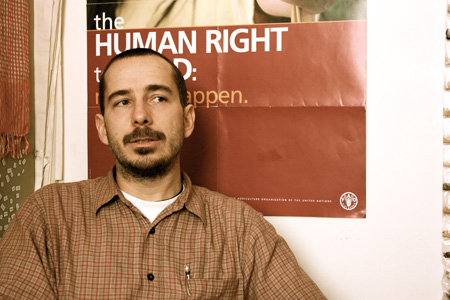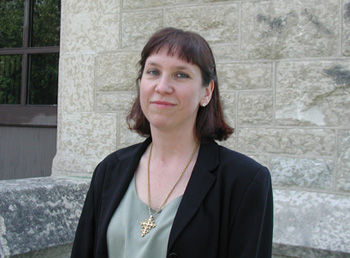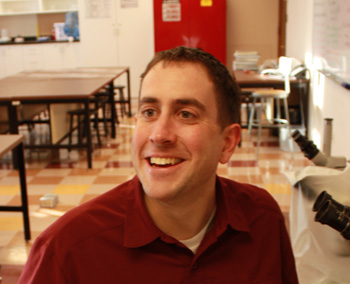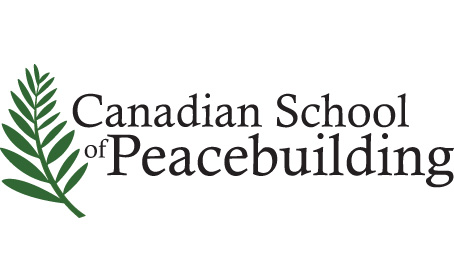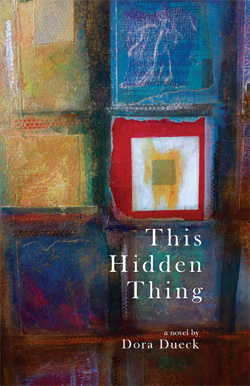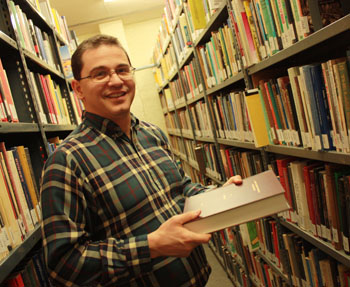John Bell of Scotland and Canada’s Ovide Mercredi among Renowned Instructors for First Session, June 14 – 18, 2010
For release May 27, 2010
When Canadian Mennonite University hosts its second annual Canadian School of Peacebuilding (CSOP) three weeks from now, June 14 to July 2, 2010, it will welcome a diverse group of peacekeepers to its south Winnipeg campus.
CSOP this year welcomes 12 instructors ready to share insights and perspectives at CSOP’s summer program, through its eight one-week intensive courses for professional development and academic credit. Applications in hand to date represent interested individuals from over 30 countries.
“We are honoured to welcome local and international members of the world peacemaking community as CSOP instructors for the 2010 program,” says CSOP Co-Director Jarem Sawatsky. CSOP aims to create a space where people from different backgrounds and perspectives can connect in positive and respectful ways—learning together, supporting each other, and creating networks of engaged peacebuilders. CSOP is for peacebuilders from all faiths, countries, and identity groups.
The 2010 course offerings include the music of social justice, contested food systems, indigenous practices of nonviolence, intractable conflicts, peace skills practice, Mennonite approaches to peace, restorative justice, and congregational peacebuilding.
“The CSOP community is shaped by an ethic of respect and collaboration,” says Valerie Smith, who was recently appointed Co-Director along with Sawatsky. “We bring peacebuilders from around the world together in a collaborative learning community.” CSOP aims to nurture and equip its participants for various forms of peace practice and expose them to some of the most significant emerging ideas and teachers in the field.
Canadian Mennonite University, through Menno Simons College (CMU’s campus at The University of Winnipeg) and through its south Winnipeg Shaftesbury campus, offers one of the most comprehensive undergraduate program in peace and conflict studies in the world. Located in Winnipeg, Manitoba, CMU has over 1,800 students at its Shaftesbury Campus in Southwest Winnipeg, at Menno Simons College in downtown Winnipeg, and enrolled through its Outtatown discipleship program. CMU is a member of the Association of Universities and Colleges of Canada.
CSOP WELCOMES SEVEN INSTRUCTORS TO CSOP JUNE 14 to JUNE 18
POETS, PROPHETS, AND MUSIC OF SOCIAL JUSTICE
John Bell, The Iona Community, Glasgow, Scotland
Irma Fast Dueck, Canadian Mennonite University, Winnipeg, Canada
This course examines the relationship of worship and social justice, exploring the works of poets and prophets from biblical times on to the present, many of whom come from the fringe of the church, giving particular attention to their importance in the struggles for justice around the world.
 John Bell
John Bell
John Bell, a native of Kilmarnock, lives in Glasgow where he studied Arts and Theology. After spells of voluntary work in London and Amsterdam and engagements in student politics, he was ordained by the Church of Scotland. For ten years, he worked in youth ministry with his colleague, Graham Maule, before transferring to concentrate on music and worship.
John lectures, preaches, and conducts seminars across denominations in Europe, North America, Australasia and, more recently, in Southern Africa. He is a hymn writer, author, and occasional broadcaster on national radio and television, but retains a primary passion for congregational song. He and the work he shares with his colleagues has been honoured by the Royal School of Church Music, the Hymn Society in the U.S. and Canada, and the University of Glasgow, the first and second of which bestowed on him the status of Fellowship, the third a Doctorate.
Irma Fast Dueck 
Irma was born and grew up in Winnipeg, Manitoba. She was a university chaplain and pastor before beginning her teaching career at Canadian Mennonite Bible College (a predecessor college of CMU) in 1991. She received her Doctorate of Theology from Victoria University at the University of Toronto, a Masters of Divinity from the University of Winnipeg and a Bachelor of Arts from the University of Waterloo. Irma’s research interests frequently lead her to themes connected to the practices of the church and the theology purveyed/conveyed by those practices. In the past few years she has given more sustained focus to the rituals of the church such as worship and baptism and on themes related to power. More recently her commitment to peacemaking has led her to participate in a number of reconciliation endeavours including Muslim-Christian dialogue (sponsored by Mennonite Central Committee); she also continues to be involved with Mennonite-Catholic dialogue groups around Winnipeg.
A CREE PERSPECTIVE ON NON-VIOLENCE
Ovide Mercredi, former National Chief of the Assembly of First Nations in Canada, current Chief of Misipawistik Cree Nation in Manitoba, and current Chancellor of the University College of the North.
Mercredi will share a Cree perspective on non-violence based on traditional values and look at contemporary examples of these values. Culture and non-violence will be studied as it relates to maintaining peace and harmony within a family group or community.
Ovide Mercredi
 Chief Ovide Mercredi is the first Chancellor of the University College of the North. He is a Cree, a lawyer, a negotiator, an author, a lecturer in Native Studies, and an activist on behalf of First Nations in Canada. He is known for his involvement in constitutional law reform issues, and Aboriginal and Treaty rights negotiations. He was a sessional adjunct professor on Aboriginal peoples at the University of Sudbury, the University of Lethbridge, and McMaster University. In addition, he has lectured at other Canadian universities, including the University of Manitoba and The University of Winnipeg. Mercredi acted as a key adviser in First Nations’ opposition to the Meech Lake Accord, and in 1989 was elected as the Manitoba Vice-Chief of the Assembly of First Nations. He held the position of National Chief of the Assembly of First Nations from 1991 to 1997, and led the First Nations negotiations in the Charlottetown Accord. Among Chief Mercredi’s many honours and awards are the Order of Manitoba, nomination for the Gandhi Peace Prize, and honorary law degrees from Bishop’s University, St. Mary’s University, and Lethbridge University.
Chief Ovide Mercredi is the first Chancellor of the University College of the North. He is a Cree, a lawyer, a negotiator, an author, a lecturer in Native Studies, and an activist on behalf of First Nations in Canada. He is known for his involvement in constitutional law reform issues, and Aboriginal and Treaty rights negotiations. He was a sessional adjunct professor on Aboriginal peoples at the University of Sudbury, the University of Lethbridge, and McMaster University. In addition, he has lectured at other Canadian universities, including the University of Manitoba and The University of Winnipeg. Mercredi acted as a key adviser in First Nations’ opposition to the Meech Lake Accord, and in 1989 was elected as the Manitoba Vice-Chief of the Assembly of First Nations. He held the position of National Chief of the Assembly of First Nations from 1991 to 1997, and led the First Nations negotiations in the Charlottetown Accord. Among Chief Mercredi’s many honours and awards are the Order of Manitoba, nomination for the Gandhi Peace Prize, and honorary law degrees from Bishop’s University, St. Mary’s University, and Lethbridge University.
Our contested food system: cultivating a just peace (In collaboration with Canadian Foodgrains Bank)
Cathy Campbell, Rector of St. Matthew’s Anglican Church, Winnipeg, and author Stations of the Banquet: Faith Foundations for Food Justice
Martin Entz, Professor in the Department of Plant Science at the University of Manitoba, researcher on cropping systems and natural systems agriculture.
Kenton Lobe, Instructor in International Development Studies at Canadian Mennonite University, Winnipeg, former food policy advisor for Canadian Foodgrains Bank, and organic farmer
Ray Vander Zaag, Assistant Professor of International Development Studies at Canadian Mennonite University, formerly with Canadian International Development Agency as a Project Officer
An interdisciplinary team including an agricultural scientist, a geographer, a theologian and a food activist will teach the course. Dialogue and participant engagement will play a critical role in the learning process.
This course examines the current realities of our food system, mainstream prescriptions, and emerging discourses around local food systems, sustainable agriculture and food sovereignty / democracy, with the aim of understanding the worldviews that underpin them.
It pays particular attention to faith-based narratives and the possibilities for cultivating a just peace in what are being called “food wars.”
 Cathy Campbell
Cathy Campbell
Reverend Dr. Cathy C. Campbell, rector of St.Matthew’s Anglican Church in the inner city of Winnipeg, is actively involved in the challenges of living out the food and justice dimensions of the Gospel. She is author of Stations of the Banquet: Faith Foundations for Food Justice (2003) and Faith as if Food Matters (2008). Prior to her ordination she taught at Cornell University and the University of Toronto and held volunteer positions in a variety of non-governmental organizations. She is delighted to have finally returned to her roots on the prairies.
Martin Entz
 Martin Entz is a professor of “natural systems agriculture” in the University of Manitoba’s faculty of agricultural and food sciences. Martin has spent 20 years developing food production systems based on nature’s own template. Projects include no-tillage (conservation) farming, organic farming, integration of animals and crops for small-holder production, and development of perennial grains. Martin heads the Glenlea study—Canada’s oldest organic cropping plots. Martin’s international work includes a “pesticides reduction” project in cooperation with universities in Central America. Martin enjoys rural extension and interaction with farmers. Martin is engaged in the debate around “power” and food. He questions the benefits of genetically modified (GM) crops, and worries GM will decrease biological diversity necessary for a sustainable food system. Martin and his family operate a small farm near Libau, Manitoba.
Martin Entz is a professor of “natural systems agriculture” in the University of Manitoba’s faculty of agricultural and food sciences. Martin has spent 20 years developing food production systems based on nature’s own template. Projects include no-tillage (conservation) farming, organic farming, integration of animals and crops for small-holder production, and development of perennial grains. Martin heads the Glenlea study—Canada’s oldest organic cropping plots. Martin’s international work includes a “pesticides reduction” project in cooperation with universities in Central America. Martin enjoys rural extension and interaction with farmers. Martin is engaged in the debate around “power” and food. He questions the benefits of genetically modified (GM) crops, and worries GM will decrease biological diversity necessary for a sustainable food system. Martin and his family operate a small farm near Libau, Manitoba.
Kenton Lobe 
Kenton Lobe’s interest in food and agriculture stems from his interdisciplinary Master’s degree in Natural Resource Management. His fieldwork was undertaken in Kerala, India where he explored the social and ecological impacts of globalizing shrimp markets on a small-scale fishing community. Kenton is a teacher/practitioner at heart and until recently balanced his teaching in International Development Studies at Canadian Mennonite University and Menno Simons College with work at an international development NGO. He spent six years working with the Canadian Foodgrains Bank in Winnipeg as Policy Advisor, examining the structural injustices that allow hunger to exist in a world that produces enough food for all. In particular, his work focused on Canadian public policies surrounding issues of agricultural trade, the human right to food, and development assistance for small-scale farmers in the global South. This work took him to the World Trade Organization, the Food and Agriculture Organization of the UN.
Ray VanderZaag
 Ray VanderZaag was raised on a potato farm in south-central Ontario. After graduating from Calvin College (B.Sc. – Biology) and Michigan State University (M.Sc. – Crop and Soil Sciences), he went to work in Haiti with the Christian Reformed World Relief Committee. During the first five years in Haiti, he worked in a rural community development program, supporting local staff and community groups involved in agriculture, reforestation, cooperative, literacy, water, and leadership activities. The next three years he worked in Port-au-Prince giving overall leadership to three CRWRC programs in Haiti. Returning to Canada, he earned an M.A. in International Affairs (Development Studies) and a Ph.D. (Geography) at Carleton University. His dissertation involved 11 months of field research on NGO/local community relations in rural Haiti. Ray then worked for a year for the Canadian International Development Agency as a project officer in the Southeast Asia Regional Program before joining CMU’s faculty. Ray also teaches one course per year in the IDS program at Menno Simons College, CMU’s campus at UWinnipeg.
Ray VanderZaag was raised on a potato farm in south-central Ontario. After graduating from Calvin College (B.Sc. – Biology) and Michigan State University (M.Sc. – Crop and Soil Sciences), he went to work in Haiti with the Christian Reformed World Relief Committee. During the first five years in Haiti, he worked in a rural community development program, supporting local staff and community groups involved in agriculture, reforestation, cooperative, literacy, water, and leadership activities. The next three years he worked in Port-au-Prince giving overall leadership to three CRWRC programs in Haiti. Returning to Canada, he earned an M.A. in International Affairs (Development Studies) and a Ph.D. (Geography) at Carleton University. His dissertation involved 11 months of field research on NGO/local community relations in rural Haiti. Ray then worked for a year for the Canadian International Development Agency as a project officer in the Southeast Asia Regional Program before joining CMU’s faculty. Ray also teaches one course per year in the IDS program at Menno Simons College, CMU’s campus at UWinnipeg.
Visit www.cmu.ca/csop
For CSOP information, contact:
CSOP Co-Director Valerie Smith
vsmith@cmu.ca; Tel. 204.487.3300 Ext. 315
Canadian School of Peacebuilding at CMU
For CMU information, contact:
Nadine Kampen, CMU Communications & Marketing Director
nkampen@cmu.ca; Tel. 204.487.3300 Ext. 621

